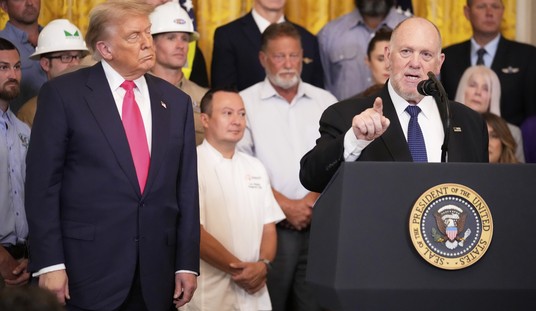This is part four of a four part series on the problems in the conservative movement that led to presumptive GOP nomination of Donald Trump. Previous installments: Part 1, Part 2, Part 3.
One of the things that has badly weakened the conservative movement is that capitalism as a philosophy has fallen drastically out of public favor, and the conservative movement seems not to have noticed (or done anything to stop it). The first indication of the seriousness of the problem was the laughing dismissiveness GOP operatives displayed towards the idea of a general election of Bernie Sanders in the early days of the election.
“The man calls himself a socialist!” I heard many a Republican exclaim on television. “I hope to God we get to run against a guy who won’t even defend capitalism!” Nowadays, with numerous public polling showing that Bernie Sanders would beat any Republican in the field by 15-20 points, most Republicans are quietly praying that the DNC superdelegates don’t wise up and veto the will of Democrat voters – because as much as Hillary is likely to beat Trump, Bernie Sanders would rout him in historic fashion.
Democrats, though, have never believed much in capitalism, and independent voters are notoriously inconsistent in their beliefs. The troubling thing is that Trump ran on a platform that was ambivalent to capitalism from day one, and a plurality of Republican voters simply did not care.
He opened the bidding in the early days of his campaign by openly grousing that wealthy people on Wall Street weren’t being taxed enough. He repeatedly drew applause on the campaign trail by stating that the government “wasn’t taking care of people” and promising that he would bring this carelessness to an end. To the extent that he had a single consistent position on the campaign trail, it was that he was vociferously opposed to free trade, which is capitalism writ global. When he was asked the three main functions of the Federal government, he included “education” and “housing” in his answer, which is pretty much the most anti-capitalist answer possible.
At every step of the way, Trump’s opponents hopped up and down, pointed and screamed, “this man doesn’t believe in conservatism,” by which they really meant (at least in part) that he didn’t believe in free market capitalism. And although the attack was manifestly true, it was also singularly ineffective – which means that about 40% of Republican voters view defense of capitalism as either optional or undesirable.
Which is another way of saying that capitalism is in deep, deep trouble.
Recent polling confirms how far into disfavor capitalism has fallen with the American public:
A couple of weeks ago, a poll conducted by the Harvard Institute of Politics found something startling: only 19% of Americans ages 18 to 29 identified themselves as “capitalists.” In the richest and most market-oriented country in the world, only 42% of that group said they “supported capitalism.” The numbers were higher among older people; still, only 26% considered themselves capitalists. A little over half supported the system as a whole.
This represents more than just millennials not minding the label “socialist” or disaffected middle-aged Americans tiring of an anemic recovery. This is a majority of citizens being uncomfortable with the country’s economic foundation—a system that over hundreds of years turned a fledgling society of farmers and prospectors into the most prosperous nation in human history.
There’s a root cause to all this anti-capitalist angst that isn’t all that easy to solve. It used to be that even if you weren’t particularly bright or skilled, if you were a hard worker with a reasonably strong back, you could have a job that provided you basic human dignity and would allow you to provide for your family.
The need for those jobs has fallen off drastically and looks to fall off even more for the foreseeable future, as technology and improved process management simply remove the need for humans to do certain jobs. And it isn’t (mostly) that the jobs are going away to foreign countries, it’s that they don’t exist at all. Manufacturing output is up – way up – in the United States. American companies are making way, way more stuff than they used to. They are just using less human beings to do it. This graph from the Bureau of Labor and Statistics illustrates the problem:

This isn’t just a problem. There are real life benefits to the fact that stuff is getting made cheaper, and we all reap the benefits of lower costs. If not for the technological revolution that is frustrating the hopes and dreams of Trump voters, inflation would make the average American’s current cost of living intolerable. But it has created a class of people who are just not able to contribute meaningfully to the economy and who are not really able to understand why.
The reality is that we are going to approach the point where we could, if we wanted, provide a relatively comfortable existence to everyone in the country, including to people who have no jobs and no marketable skills. And this realization is behind the push to basically force the government to do just that. But it ignores the principle, observed since Biblical times and before, that if you don’t make everyone work for their bread, no one will work for their bread. There’s no reason for the people who are capable of designing and building robots to actually do those things if the fruits of their labor are just going to be taken away and given to people who are doing nothing – and so they’ll quit and just receive the free stuff themselves. The destruction of moral hazard is a risky game to play as a society.
Just as importantly, even if a person is reasonably well cared for by his government in the absence of having an actual job, the destruction of human dignity that comes with having a meaningful career cannot be bought back so easily.
As a movement, we haven’t confronted the challenges that this tension has created well, and we haven’t even attempted it much. We’ve instead assumed – without reason, it turns out – that everyone was with us on the whole idea that capitalism is a Good Thing, and been flabbergasted when people rejected the premise entirely.
As a result, we find ourselves facing the abyss. Make no mistake, as a country we are openly flirting with the adoption of European style socialism because we’ve failed to properly defend that which makes us different. And that’s one of the reasons that neither of the candidates for President this year is likely to be a staunch defender of capitalism itself.













Join the conversation as a VIP Member